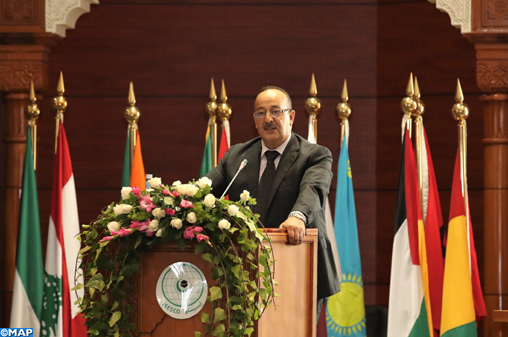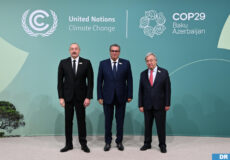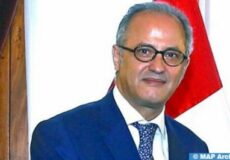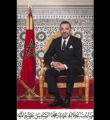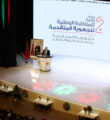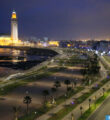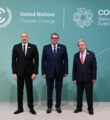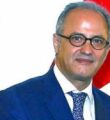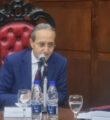HM the King Sends Message to 8th Islamic Conference of Environment Ministers
Rabat – HM King Mohammed VI sent a message to the participants in the 8th Islamic Conference of Environment ministers, which opened Wednesday in Rabat.
Here follows the full text of the royal message, which was read out by minister of Culture and Communication, Mohamed Laaraj:
“Praise be to God,
May peace and blessings be upon the Prophet, His Kith and Kin
Your Highnesses,
Your Excellencies,
Ladies and Gentlemen,
It gives me great pleasure to send this message to the participants in the Eighth Islamic Conference of Environment Ministers, to which I was keen to grant my patronage, given that I care so deeply about environmental and sustainable development issues.
First of all, I should like to welcome you most warmly to your second home, Morocco. I also wish to reiterate my congratulations to His Excellency Dr. Salim bin Mohammed Al-Malik on his appointment as Director General of the Islamic Educational, Scientific and Cultural Organization, and to wish him every success in his mission.
I appreciate the commendable efforts this Organization has been making to promote joint Islamic cooperation in all fields, especially with respect to environmental issues. Indeed, scientific, cultural and religious considerations play a key role, not just in promoting sustainable development but also in the preservation of the environment.
Ladies and Gentlemen,
The issues pertaining to the environment and to sustainable development are among the major challenges the world is facing today. Many international studies point to an unprecedented depletion of natural resources, to a dramatic rise in pollution levels as well as to a major disruption of the global environmental balance. This situation has serious and alarming consequences for our planet today, including evident adverse impacts on the economic, social and health situation.
It means there are inexorable risks for all the countries of the world, especially vulnerable ones.
Pressing environmental problems and their negative effects – on which political and geographical borders have no bearing – can be tackled only through close cooperation between States. Whatever its capabilities, no single country can effectively address these problems on its own.
With that in mind, your conference provides an opportunity for our countries to assess the efforts made in this field and to coordinate cooperation and partnership between all stakeholders in order to achieve our desired goals and invest in the future of our countries and our peoples.
Ladies and Gentlemen,
The Kingdom of Morocco has embarked on a collective mobilization process, domestically and at the international level, and has been pursuing a proactive policy for the preservation of the environment. It involves mustering energies and pooling efforts for the achievement of sustainable development, in which the preservation of the environment is a primary concern.
Thus, environmental preservation is mainstreamed in all development plans and sectoral development strategies. Enshrining the right to a safe environment in the Constitution was one more step that established Morocco’s resolute commitment to environmental conservation.
Meanwhile, the Kingdom of Morocco’s involvement in accelerating the achievement of the United Nations Sustainable Development Goals 2030 has been further enhanced by the adoption of the National Strategy for Sustainable Development, for which a participatory approach was used. This approach integrates economic, social and environmental dimensions and is based on a clear constitutional and legal frame of reference.
As part of the Strategy’s implementation, a framework for governance and a set of sectoral plans for sustainable development have been established with a view to promoting the transition to a green economy by 2030.
Moreover, the objectives set out in the charter for an exemplary civil service include the mainstreaming of environmental approaches in public buildings, encouraging sustainable and responsible public procurement, and urging civil servants to set an example by gradually transitioning to sustainable transport.
Needless to say, the achievement of the strategy’s objectives hinges on the involvement of all the stakeholders concerned. This can be accomplished thanks to a profound cultural change involving the raising of environmental awareness and the inclusion of environmental education – especially for young people – in syllabi and curricula.
This should be reinforced by the adoption of action programs for sensitization, interaction and environmental education to foster individual and collective behaviors that are consistent with the requirements of environmental protection, and in keeping with the principles and values of our pristine Islamic religion.
Ladies and Gentlemen,
Aware of the need to ensure that international agendas on combating climate change are coherent and integrated, the Kingdom of Morocco has sought to make sure its Nationally Determined Contribution to curb greenhouse gas emissions is compatible with the Sustainable Development Goals.
To this end, a climate change competence center has been set up as a means to accompany and support national actors, share Morocco’s experience in this field and promote South-South cooperation, particularly with Islamic and African countries.
Furthermore, the Kingdom of Morocco has set itself the goal of reducing its greenhouse gas emissions by 42%. This objective will be achieved mostly through the implementation of the National Energy Strategy. Under this strategy, we are seeking to increase the share of electricity generation from renewable energy sources, through several major pilot projects that concern solar, wind and hydro power.
With that in mind, my country has developed and started implementing the national adaptation plan to match national priorities with international climate change commitments. Another aim is to enhance adaptation capabilities, make sure they are compatible with sectoral priorities and regional specificities, and mobilize the technical support and financing needed to achieve set objectives.
Ladies and Gentlemen,
I believe in the importance of collective environmental action and its role in strengthening joint Islamic cooperation, as it allows for greater complementarity, coordination and the exchange of know-how and experiences between Islamic countries.
In this regard, the Kingdom of Morocco has taken the first steps towards setting up the Islamic Academy for the Environment and Sustainable Development. This ambitious academic project aims to promote science, deepen academic thinking and raise awareness about current and future environmental and development challenges. It will also help determine how to tackle challenges in the areas of governance, science, technology and capacity building.
Furthermore, one of the Academy’s objectives is to be a leader in the field of sustainable development, making sure it promotes the use of work methods inspired by Islamic culture when it comes to exploiting natural resources.
The fact that the necessary measures must be taken to ensure that the Academy is affiliated with the Organization of Islamic Cooperation (OIC) has been emphasized. This would enable the Academy to use international cooperation mechanisms in order to ensure optimal performance and play its role fully within the OIC by interacting with similar regional and international institutions.
I am sure your constructive academic debate and the appropriate proposals and recommendations that will be made at this important conference will have a positive impact on the promotion of environmental and sustainable development issues in the Muslim world.
Once again, welcome to Morocco. I wish you a pleasant stay and pray that Almighty God grant you every success.
Wassalamu alaikum warahmatullah wabarakatuh.”



